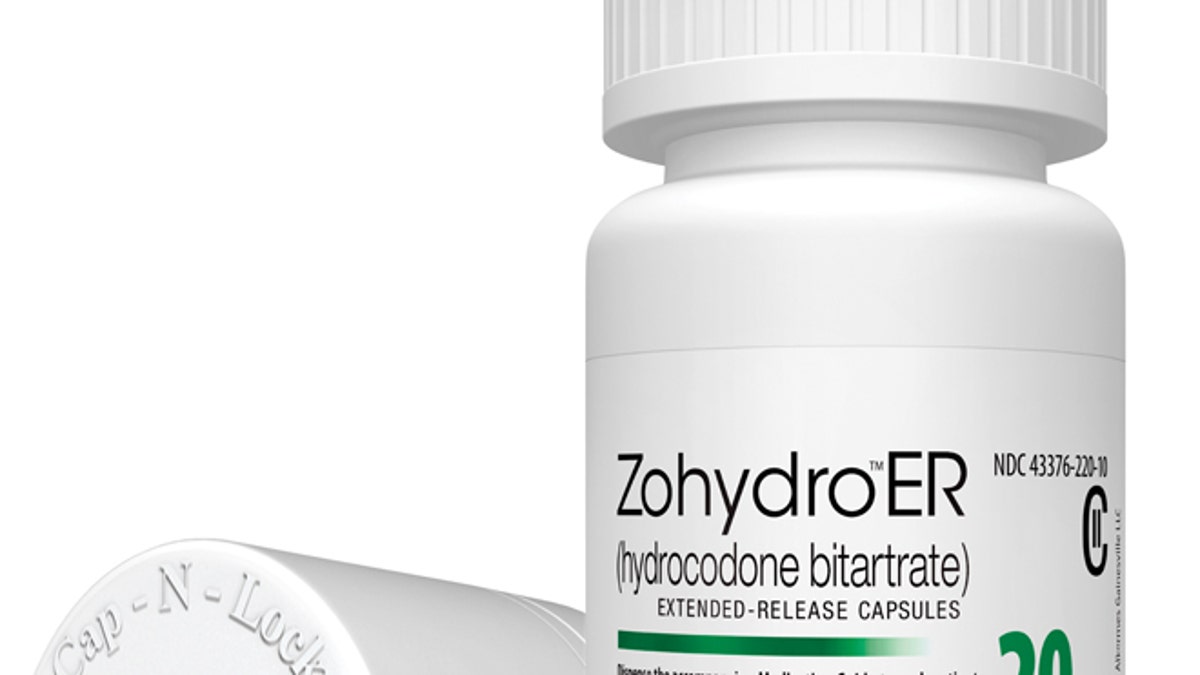
Zohydro (Zogenix)
WASHINGTON – State and federal lawmakers are working in tandem to get the controversial painkiller Zohydro ER permanently shelved, even as the head of the Food and Drug Administration defends the agency’s decision to approve the powerful opiate some critics call “heroin in a capsule.”
Since its approval last October, Zohydro, an extended-release form of hydrocodone, has come under scrutiny from members of Congress, state attorneys general, doctors and addiction specialists who have worked to block the pill from being sold in the U.S.
FDA Commissioner Margaret Hamburg strongly defends the agency’s approval, arguing that Zohydro’s benefits outweigh the negative consequences. Simply put, she says, people in pain need more options.
But others, like Sen. Joe Manchin, D-W.Va., say the agency should rescind its approval of the painkiller. Manchin, whose home state leads the nation in prescription overdoses and abuse, has worked with New York Sen. Chuck Schumer to overturn the approval.
The lawmakers have called on outgoing Health and Human Services chief Kathleen Sebelius to force the FDA to rescind its approval, citing the alleged danger of the drug and as well as the growing abuse of prescription drugs in the country. Overdoses from prescription drugs have risen steadily over the past decade and account for an estimated 16,000 deaths a year in the United States.
Three Republican lawmakers -- Sens. Mitch McConnell of Kentucky, Lamar Alexander of Tennessee and Tom Coburn of Oklahoma -- have also joined the call.
In March, Manchin submitted legislation, the “Act to Ban Zohydro,” which offered a 13-point argument on why the federal agency should rescind its approval.
Among his complaints, which have been echoed by doctors and others in the medical field, is the potential for abuse and addiction.
According to the Institute of Medicine, 100 million adult Americans suffer chronic pain every year, and the cost to the nation is between $560 billion and $635 billion annually.
Zohydro ER involves a powerful formula of hydrocodone, the opiate that’s the main ingredient in Vicodin. Critics argue that Zohydro’s potency makes it dangerous and open to abuse because it lacks a tamper-resistant feature which lets it be ground up, snorted or injected.
On Thursday, Hamburg called the “recent attention” by state policymakers on opioid abuse “commendable” on her FDA Voice Blog, but said instead of blocking the sale of Zohydro based on a fear of abuse and addiction, providers should screen patients before they prescribe the drug and while they are on it.
Zogenix Inc., the San Diego, Calif.-based company behind the drug, says it has “taken extraordinary steps to support the appropriate use of Zohydro ER through a voluntary, comprehensive set of educational tools and safeguards to augment the FDA industry mandated class-wide Risk Evaluation Mitigation Strategy (REMS) for extended-release opioids.”
The company also adds that as part of their continued effort to provide “additional safeguards against potential diversion, overdose and misuse of Zoyhydro ER,”
Zogenix has created a board of experts, though it does not say what those experts will do.
The company also says it provides consumers taking Zohydro ER “access to free locking pill bottle caps and discounted safe-storage units to prevent others in the home from obtaining easy access to medicine that was not prescribed for them.”
The FDA’s decision in October 2013 to approve Zohydro over the objections of its staff and advisory committee raised eyebrows in the medical community, with many questioning the motivation behind green-lighting the drug.
Others, though, questioned Manchin’s motives, since his campaign to kill Zohydro could benefit his daughter, Heather Manchin Bresch, the CEO at rival pharmaceutical company Mylan.
Melanie Sloan, executive director at Citizens for Responsibility and Ethics in Washington, told FoxNews.com that Manchin’s push has more to do with the skyrocketing number of prescription overdoses in his state than any type of financial gain for his daughter. She also said Manchin has spoken against drugs Mylan has introduced too.
“His state has a lot of overdoses,” Sloan said. “He had to get on board with this and push for the ban.”
The fight against Zohydro is also being fought on the state level.
So far, 29 states have asked the federal agency to reverse its decision.
Vermont Gov. Peter Shumlin announced an emergency order that would make it illegal for doctors there to prescribe the drug.
Massachusetts Gov. Deval Patrick took it a step further.
In February, Patrick cited a “public health emergency” brought on by rising deaths from drug addiction to ban Zohydro from being sold in his state.
That didn’t sit well with Zogenix Inc., the makers of the drug, who took Patrick to court.
U.S. District Court Judge Rya Zobel sided with Zogenix and ruled that Patrick’s attempt to ban the drug outright was unconstitutional, effectively saying that federal law trumps state law.
The ruling, however, didn’t stop Patrick, who responded by slapping another set of restrictions on Zohydro beyond those mandated by the FDA.
The ruling also didn’t stop drug abuse prevention groups, state lawmakers or labor leaders from rallying outside the statehouse in Boston earlier this week.
On Tuesday, more than 150 people, wearing white T-shirts that said “Stay Strong” and carrying signs calling Zohydro “heroin in a capsule,” marched on the statehouse steps.
“We don’t need any more opiates! We don’t need any more addiction!” Steven Tolman, president of the Massachusetts AFL-CIO, shouted at the rally.
In Ohio, Republican state Reps. Robert Sprague and Ryan Smith introduced a bill that would make it illegal to possess or even prescribe the painkiller which is scheduled to hit the market later this month.
"It's been described as a whopping dose of hydrocodone in a pill that's easy to crush," Smith said of Zohydro in a statement. "The safety concerns in my opinion outweigh the small benefit for the sliver of population we're talking about."
Hamburg, though, says delaying the drug until it has an abuse-deterrent formulation isn’t the way to go.




